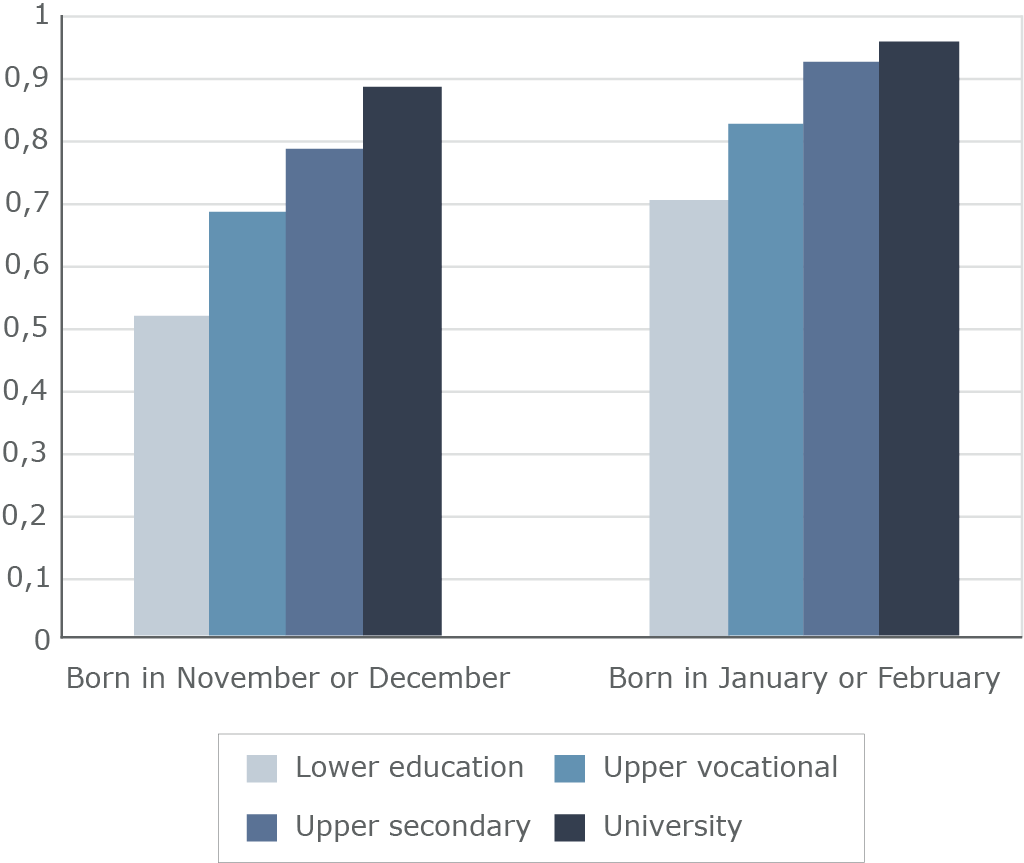How does a child’s birth month affect their chances of success in primary school? And to what extent is their success dependent on their socioeconomic background? In this study, Fabrizio Bernardi explores the chances of students to be successfully promoted after every grade in primary school in France. The analysis is based on the concept of compensatory advantage, which states that the lives of individuals from privileged socioeconomic backgrounds are less dependent on prior negative events. An early disadvantage is likely to persist or grow larger over time for people from disadvantaged families, whereas it is likely to attenuate for those from more advantaged families. This is because parental investments in upper-class families tend to compensate for an early disadvantage, whereas disadvantages are reinforced among the lower class.
The characteristics of the French educational system make it particularly suitable to study grade repetition: First, it is a system with strict rules regarding the age when children enter school and postponement of admission into primary education is not permitted by educational authorities (with the exception of pupils with special educational needs). Children must start primary education the same calendar year during which they turn six. Children born in December are therefore the youngest in their school cohort and those born in January are the oldest. Second, the proportion of children who have to repeat a grade in primary school is very high in the country - about 20 per cent -, one of the highest in OECD countries. Finally, previous studies have shown that grade repetition leads to long-term negative consequences in France, such as lower wages at labour market entry.
Results show that being the youngest in a school class (those born in the months just before the cut-off: November or December) reduces the chances of promotion by 14 percentage points, compared to the oldest children (those born just after the cut-off: January or February). However, being the youngest in one’s school cohort entails less negative consequences for children of highly educated parents. For children from less educated families, chances of promotion are 19 percentage points lower for students born at the end of the year compared to their peers born in January or February. For students from highly educated families, the birth month penalty is much smaller, 7 percentage points.
Figure 1 displays this compensatory advantage; it shows the predicted probabilities of promotion after each grade in primary education. Differences between the chances for successful promotion based on parents’ education are larger for students born in November or December. This means inequality based on social background is larger among students who were younger when they entered school (i.e., children born in November or December), compared to students who were older when school started (i.e., children born in January or February). Moreover, for children whose parents have a university education, there is almost no difference between being younger or older at the start of school.

Figure 1. Predicted probabilities of successful promotion after every grade in primary education in France by months of birth and parental education.
Source: Source: Panel d'Élèves du second degré 1995 (Panel of students starting lower secondary education in 1995) collected by the French Ministry of Education; own calculations.
Note: Sample restricted to n = 6,091 students born in France, without special educational needs in French elementary school and with valid information on parental education, who were born between November and February.

*This PopDigest has received funding from the European Union's Seventh Framework Programme (FP7/2007-2013) under grant agreement n° 320116 for the research project FamiliesAndSocieties. FamiliesAndSocieties (www.familiesandsocieties.eu) has the aim to investigate the diversity of family forms, relationships and life courses in Europe, to assess the compatibility of existing policies with these changes, and to contribute to evidence-based policy-making. The consortium brings together 25 leading universities and research institutes in 15 European countries and three transnational civil society organizations.